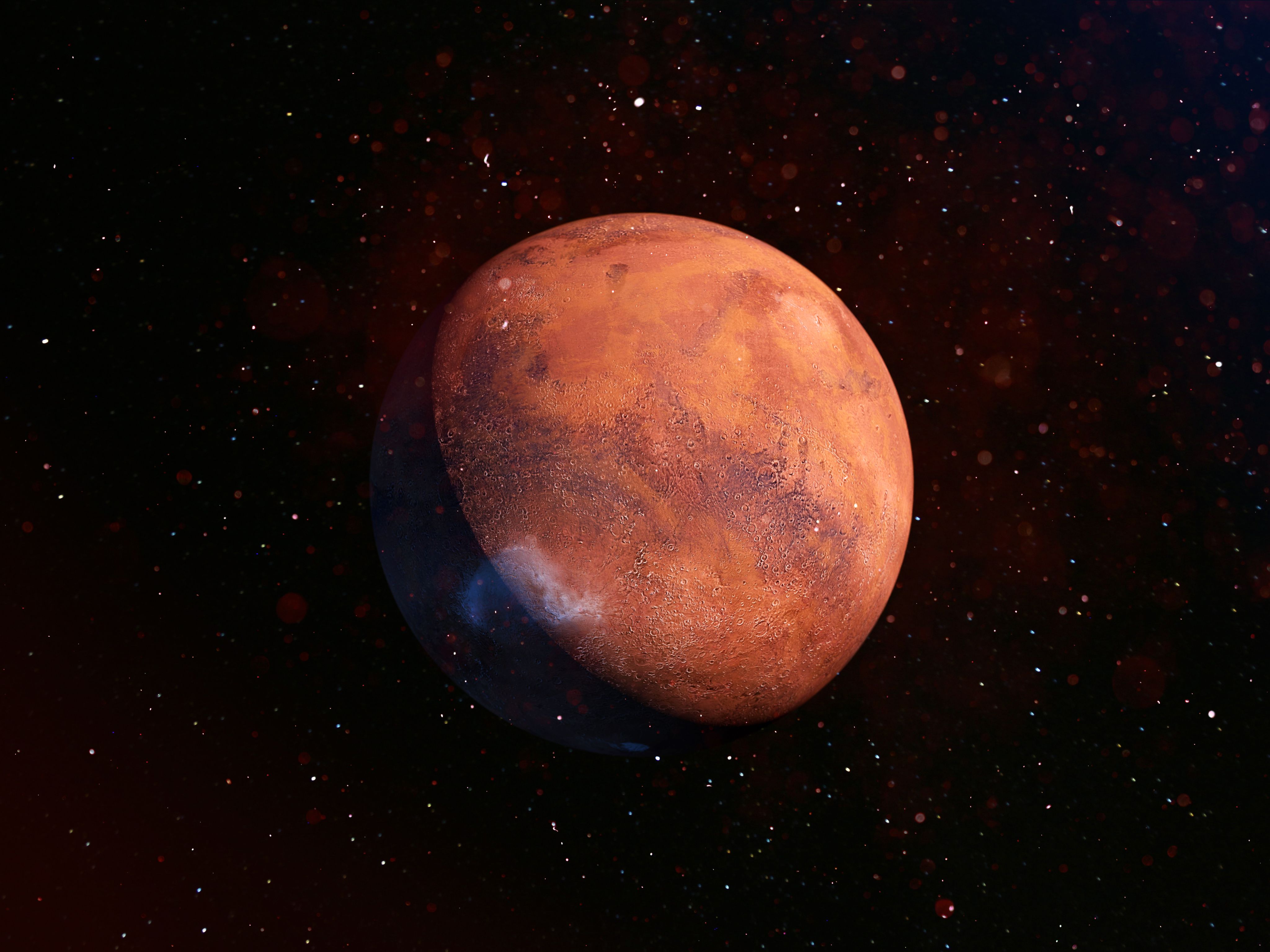Mercury rising: the story of Dr Andrew Prentice

Mathematician Dr Andrew Prentice (TC 1962) is considered a world leader when it comes to explaining the formation of the solar system, though, as Andrew found out the hard way, when your ideas are bold and your calculations sharp, it can be hard to be taken seriously.
I wonder how many sausages I would have to stack, one on top of the other, to reach the moon? mused a six-year-old Andrew Prentice as he watched his mother put away a string of sausages from the butcher. He had always been intrigued by how far away the moon was but struggled to find the right metric to quantify it.
While some children would have briefly stared at the sky before shifting their attention to dinosaurs or the ocean or volcanoes, Andrew’s fascination with the night sky never dissipated. And he got quite good at measuring things.
Andrew is sharing these childhood memories from his home office, where books and papers are stacked high in front of framed pictures of Jupiter and Saturn. He picks up one of the books on his desk and opens it to reveal neat lines of mathematical formulae in blue, red and black ink. Some are highlighted, some are tabbed with coloured sticky notes.
He then holds up a series of loose papers scrawled with the thoughts and ideas that were too impatient to make it into a notebook. ‘Now, the disadvantage of this is that I’ve got several of these scratch pads and pages fall out,’ he says, catching a loose page that slips onto his desk. As he shuffles the papers into a more orderly pile, he adds, ‘I do find that, to be successful, you really have to be quite disciplined in keeping track of things.’
And, for Andrew, there has been a lot to keep track of.
With a natural talent for numbers, Andrew studied mathematics and physics as an undergraduate. After completing a Master of Science and winning a Royal Commission for the Exhibition of 1851 science research scholarship, he travelled to Oxford in 1967 to study for a Doctor of Philosophy in theoretical physics under the supervision of Dirk ter Haar, a well-known Dutch theoretical physicist.
Ter Haar encouraged Andrew to investigate a theory developed by French scientist Pierre-Simon Laplace about how the solar system had formed that had lain discredited and discarded for 200-odd years. ‘Laplace obviously didn’t have access to computers and what we have now,’ says Andrew, ‘so I wanted to reawaken Laplace’s model and see if it could be brought back to life, and to see if the objections that were cast on it could be overcome.’

After Oxford, Andrew took up a postdoctoral position at the Carnegie Mellon University in Pittsburgh, where he had access to the fastest computer in the United States – the ‘UNIVAC’. It was about 3 o’clock one morning, after successfully running his computer code for the first time, that Andrew had an 'aha' moment, discovering that the physical concept of supersonic turbulence, which he and ter Haar had devised in Oxford, could overcome all the objections that had been thrown at Laplace.
The discovery led to Andrew’s development of the ‘modern Laplacian theory’ of solar system formation, with which he could explain the emergence of all the planets and their properties. It sounds impressive, and it was, yet the underpinning premise of supersonic turbulence was written off as farcical by Andrew’s contemporaries.
As a young man, just shy of 30, with ‘much more energy and bright red hair’, Andrew pressed for his findings to be reported, submitting to, and being rejected by, many academic journals. ‘I had one dickens of a problem getting my paper published,’ he says with a chuckle, now having the benefit of knowing how the story ends. He realised that the only way he would ever be able to convince other theoreticians that he was ‘pushing the right wheelbarrow’ was with proof. Cold, hard proof.
In 1986, Andrew was invited to join NASA’s Voyager program as a guest scientist, because though he had his sceptics, his theory drew curiosity. Throughout the 1980s, he was subsequently able to predict and confirm various features of the moons of Jupiter and Saturn and new families of moons around Uranus and Neptune.
In 1989, Nature magazine published an article about him, citing a quandary. Andrew surmises the article as: ‘Here’s this guy, Prentice. We don’t want to describe him as a maverick, but he’s got this theory, which we all regard as suss. However, how is it that he’s been able to make these successful predictions based on it?’
The simple answer is, Andrew was on the money. Gradually, the opinion of his theory shifted from ludicrous to luminary, and Andrew is now considered one of the world’s leading experts on the formation of the solar system.
After 40 years as a reader in applied mathematics, Andrew retired in late 2010. At the time, his department at Monash was being restructured, his grandchildren were arriving, and he ‘didn’t want to hang around the maths department like a bad smell’. Although he had officially packed up from the maths department, he became an affiliate of Monash’s School of Physics and Astronomy and an adjunct professor at the University of Southern Queensland. Ever humble, he’s thankful to still be able to use the university’s specialised computers.

Despite Andrew’s pioneering research and many decades in the university sector, he notes that he never became a full professor. This is largely because, as a self-confessed single-task person (‘just ask my wife’), Andrew’s research took a back seat when he began teaching, largely because he discovered he was very good at it. How many lecturers can claim a Facebook group titled ‘[Insert teacher name] Appreciation Society’, managed and joined by throngs of adoring students? And how many can top that with a Vice-Chancellor’s award for teaching excellence?
Though Andrew tells tales of awkward teenage years, when he realised that being able to recite the value of pi to 20 decimal places was not sufficient to win over a girlfriend, he is a skilled and good-humoured communicator, known for in-lecture commentary like, ‘Now I’m going to take the delta x outside – not outside the lecture theatre, just outside the brackets’, and ‘I’d better shut the door – we’ll get distracted if an emu walks by’, as catalogued among his most memorable quips, or ‘Prenticisms’, noted by his students on Facebook.
While humour was part of his secret sauce in the classroom, Andrew also put great emphasis on ensuring his students felt cared for. ‘I find that it does mean a lot if someone takes a personal interest in you or cares about you … My primary motivation is the welfare of other people.’
As well as supporting his students on a personal level, Andrew began donating to scholarships to help financially disadvantaged students as soon as he was able to do so, noting that he himself received several scholarships, including one from Trinity College.
As both a student and teacher, Andrew came to understand the importance of giving students the opportunity to study without significant financial burden and with adequate support. He credits Trinity’s scholastic environment for allowing him to flourish in his formative years, and recognises that today’s youth have many modern stressors to deal with, including climate change and technology (which didn’t bother Isaac Newton, he notes).
‘Whenever I’m feeling emotionally well, I perform so much better … You can’t do that if you have financial worries and things like that.’
In addition to donating to scholarships, Andrew also supports several other causes and institutions, including Trinity’s Theological School. Though some may wonder whether evolutionary science and religious faith are contradictory, from Andrew’s point of view, they complement each other nicely.
‘Coming from a religious background, there are so many hymns that talk about the starry heavens and the planets and the sun and the moon. It all seemed to fit together to me.’ Andrew says his faith also helped him push through the many rejections that tested him early in his career. ‘My Christian background really has stood me through some pretty difficult times … I found that having faith really does give you a basis for trying to make sense of everything.’
Despite his distinguished career to date, Andrew is still on a quest to make sense of certain things. While some may take to sudoku and crosswords in their older years to keep the synapses firing, Andrew, now 79, is revisiting his reports and calculations on Mercury, because ‘I haven’t focused on Mercury for a while,’ he says, patting a thick book next to him.
‘I have been fortunate with my research work and the music hasn’t stopped – I mean, the big lady hasn’t sat down – but I’m pretty certain that what I have done will endure and I just have to hang in a bit longer.’
Mercury, it’s your time to shine.

On being 'education people'
The success of Trinity's Pathways School can largely be attributed to the leadership of people like Dr Denis White.



